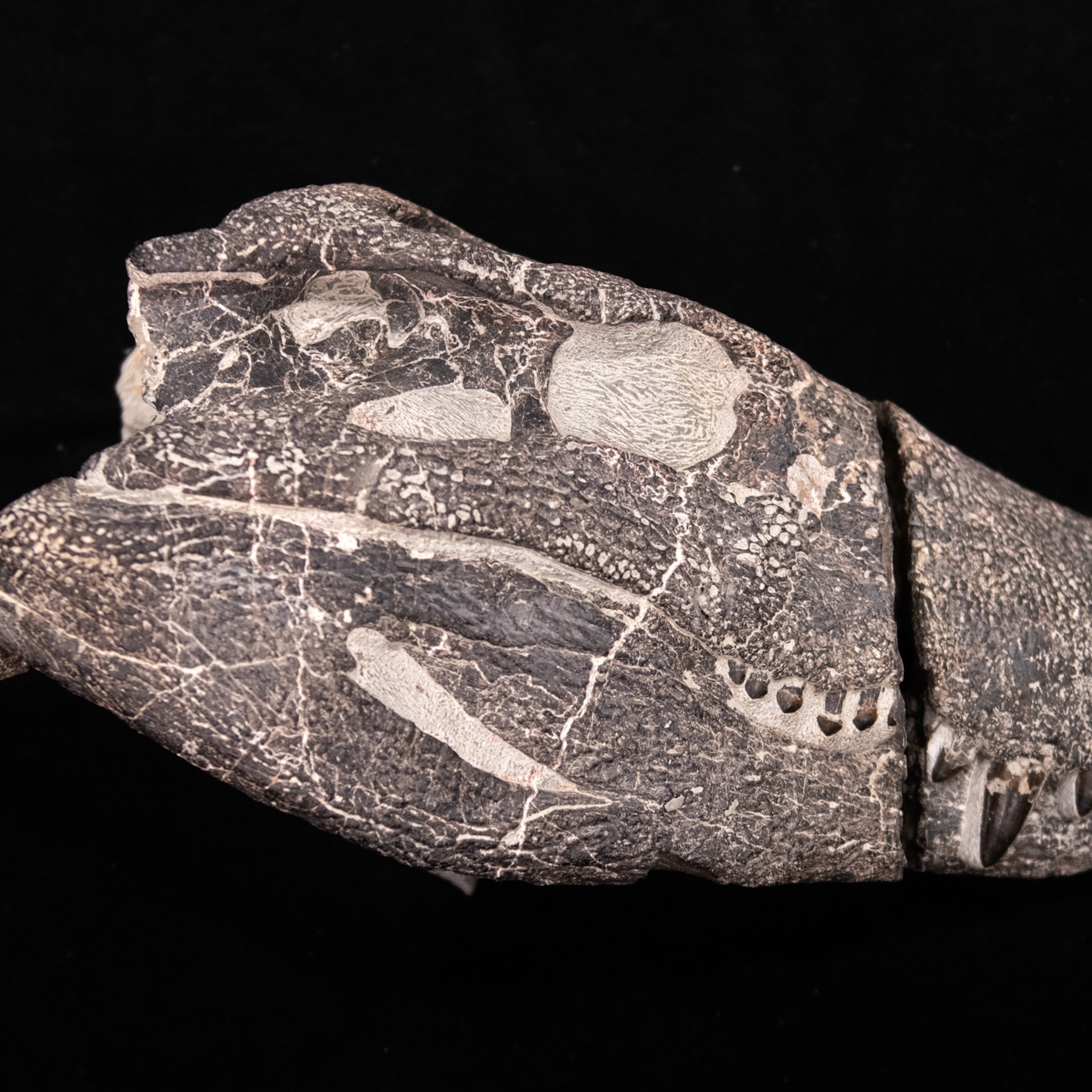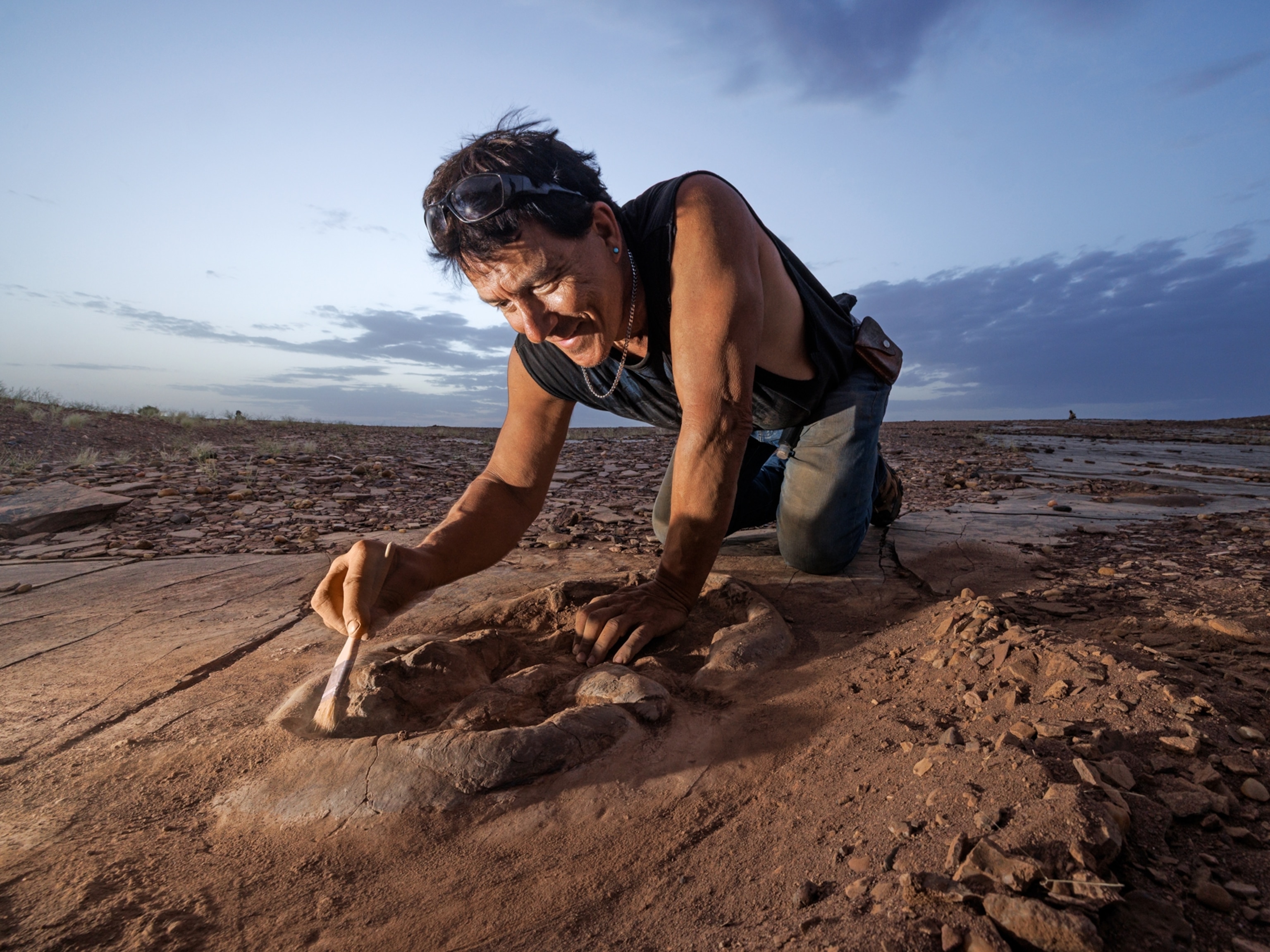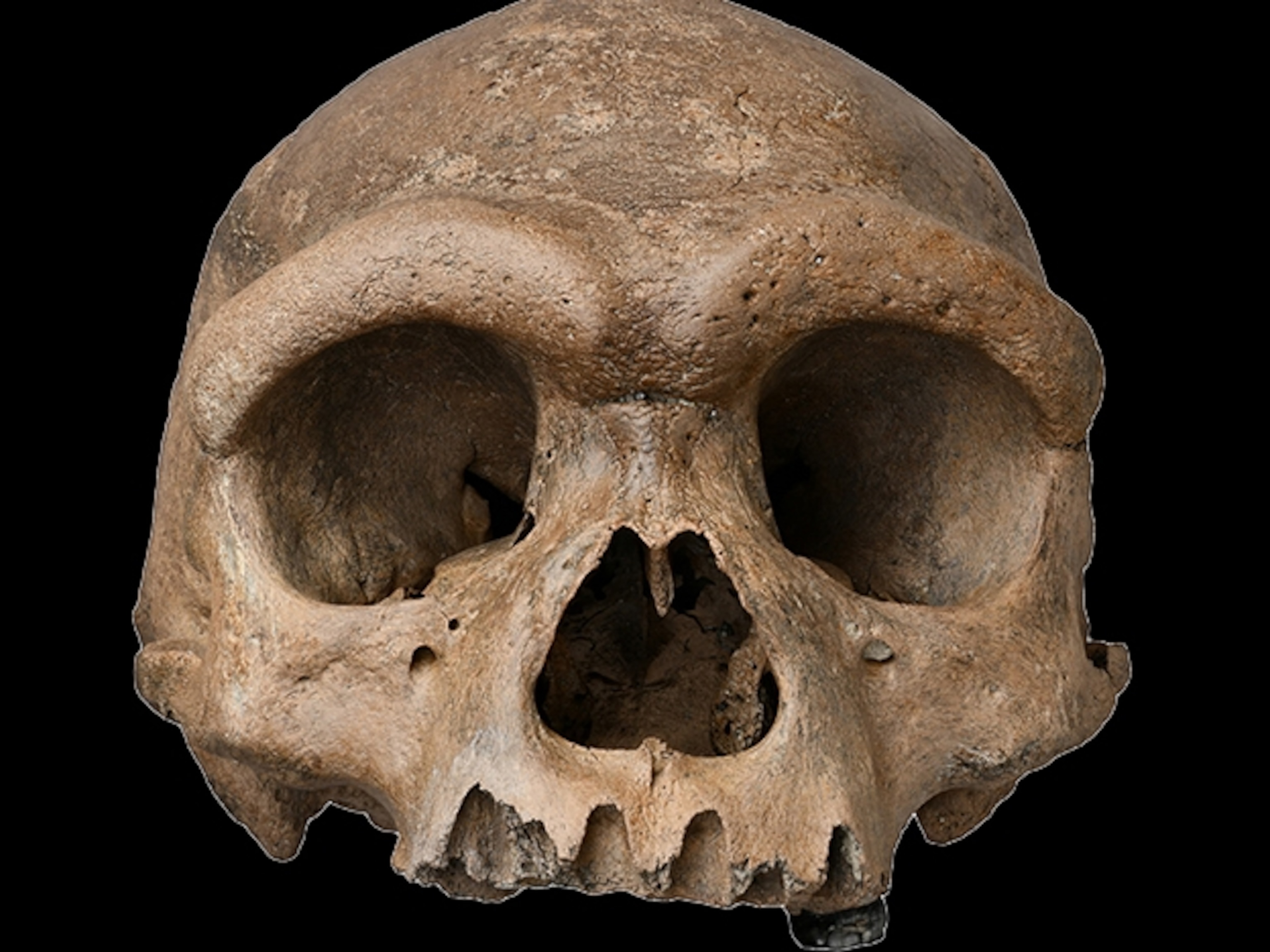
Did ancient primates walk alongside T. rex? New evidence backs up theory.
The oldest known primate fossils were dated to just after the extinction event 66 million years ago—suggesting some primate ancestors lived even longer ago.
Shortly after an asteroid strike triggered a cataclysmic extinction event 66 million years ago, a group of mammals with a proclivity for climbing trees and eating fruit began to thrive. These animals—the early relatives of primates—would give rise to a lineage that led to the first monkeys, including great apes such as gorillas, chimpanzees, and eventually, humans.
Now, scientists have discovered fossils of the oldest known primate among a cache of unusual teeth tucked away in a museum drawer for decades. Some of these teeth, recently described in the journal Royal Society Open Science, belonged to the new species Purgatorius mckeeveri, a pint-sized precursor to modern primates that lived 65.9 million years ago, just 100,000 years after the extinction event at the end of the Cretaceous period.
“It reconfigures our view of evolution,” says Gregory Wilson Mantilla, lead author of the study and a biology professor at the University of Washington who studies early mammals.
The discovery also bolsters a theory that the ancestors of primates lived alongside the dinosaurs—and somehow survived the extinction event that killed off about three-quarters of life on Earth. Two of the teeth in the new study belonged to a second, previously known species, Purgatorius janisae, which also lived 65.9 million years ago. And if two ancient primate species existed at this time, some unknown animal must have come before.
“The critical thing about there being two species is it drags the origin of the group further back,” says Mary Silcox, a paleontologist with the University of Toronto who was not involved with the study. “They have to have come from somewhere.”
Ancient clues in museum drawers
In 2003, Wilson Mantilla was rummaging through the collections at the University of California Museum of Paleontology in Berkeley when he tipped a set of ancient teeth out of their vials and peered at them under a microscope. These teeth, short with slightly rounded cusps, did not belong to any of the mammals that the then-graduate student was researching for his dissertation.
“Wow,” he recalls thinking, “they must be something that we haven’t recorded yet, something new.”
It would take more than a lifetime to study all the fossils at the museum, where fossil collections are housed in rows of cabinets whose drawers are filled with dozens or even hundreds of fossils and fragments. Altogether, there are hundreds of thousands.
The late paleontologist William Clemens, a co-author on the new study, is credited with digging up 50,000 of those specimens—including the recently described Purgatorius teeth. Clemens was a prolific fossil hunter, specializing in the evolution of small mammals, who first began working in the Hell Creek Formation of northeastern Montana in the 1970s.
“Other paleontologists spend a year or two years or five years in a particular area, take the cream off the top, and move on to a new spot,” says Wilson Mantilla, who was the last student to study under Clemens before he retired in 2002. “Bill had a different approach.”
Clemens’ fondness for the Hell Creek community may have been part of what kept him coming back for decades. He would start each field visit by sipping iced tea in the homes of the ranchers who owned the land. But the fossils in this part of the world were also an irresistible draw—“the questions that could be answered in the Hell Creek area,” Wilson Mantilla says.
We’re slowly filling in the gaps. We only have a few pieces here or there, scraps if you will, but it’s allowing us to start building a bigger picture to better understand our early evolutionary history as primates.
Stephen Chester, Biological anthropologist at Brooklyn College, City University of New York
The Hell Creek Formation is critical to understanding what killed off non-avian dinosaurs and how life evolved afterwards. Its rocks preserve a timeline of life on Earth stretching from two million years before the mass extinction to about a million years after—one of the few places in the world where fossils can be found on both sides of that boundary.
When a theory emerged in 1980 that an asteroid impact was responsible for the extinction of the dinosaurs, Clemens was skeptical. Believing dinosaurs had already been in decline, he argued that it was worth considering how other factors, such as increased volcanic activity and climate change, might have played a role. That helped set the stage for a debate that continues to this day.
Clemens hoped to tease out what happened 66 million years ago by studying how the asteroid impact affected other animals that lived alongside the dinosaurs. “So he built this huge library of fossils to look at this turning point in vertebrate and biotic history,” Wilson Mantilla says. And within that library of fossils, he stored critical clues to unraveling the evolutionary origins of our own species.
Tracing the primate lineage
Scientists have two schools of thought when it comes to the origins of primates. Some believe the lineage began around 56 million years ago, when animals that share key characteristics with modern primates show up in the fossil record. Others argue that you have to look further back.
The latter camp trace the primate lineage to plesiadapiforms, a group of mammals comprising more than 140 ancient species noted for having teeth and skeletons that are similar to those of today’s primates, ideal for grinding up fruit and moving between tree branches. These ancient animals lacked the forward-facing eyes and large brains of living primates, however, leading to a debate about whether or not the plesiadapiforms were true primates.
“I want to try to understand the origin of primates,” says Stephen Chester, a biological anthropologist at Brooklyn College, City University of New York, and co-author of the new paper. “I’m less interested in studying something that is just absolutely clearly a primate.”
In 1965, a team of scientists discovered the fossilized teeth of what would become the oldest genus of plesiadapiforms: Purgatorius. Those teeth were dated to 63 million years ago, and later fossil discoveries pushed the existence of the genus back to 65 million years ago.
Scientists have long suspected that Purgatorius was even older, however. Evolutionary models and genetic studies of modern primates suggest the first primate relatives originated about 81.5 million years ago, during the Cretaceous period—but a dearth of fossil evidence from this time has made it impossible for paleontologists to confirm the theory.
When Chester first met Clemens at a Society of Vertebrate Paleontology conference in 2009, teeth and jaw fragments were the only evidence scientists had found of Purgatorius. Upon learning that Chester was interested in the genus, Clemens invited him to search the museum’s collection for specimens.
“Sometimes people in this field hold their fossils close and don’t let other people study them,” Chester says. “But Bill was the opposite in opening up his collection to a young researcher who was very excited to collaborate with him.”
In 2012, Chester found himself looking at tiny fossil fragments under a microscope that he identified as ankle bones belonging to Purgatorius. His 2015 study with Clemens and two other colleagues analyzed the joint’s mobility and revealed that the animal could likely move effectively through trees. A picture of the earliest primate ancestors started to come into focus.
“That was one of my first major aha moments with Purgatorius,” Chester says.
Thriving in the post-extinction world
By 2018, Wilson Mantilla was kicking himself for sitting on what he knew was yet another important Purgatorius discovery. Although he had enlisted Clemens’ help in researching the fossilized teeth after finding them in 2003, life kept intervening—in the form of finishing his dissertation, completing a postdoc, and finding a job.
“I worried that we would be scooped,” he says, “that somebody would either describe something older than what we had, or they would find teeth of the same species and describe it.”
But Wilson Mantilla was finally ready to dust off the manuscript he had started. He asked Chester to collaborate on an analysis of the new fossils.
Using a technique called radiometric dating to measure the presence of compounds with a known decay rate, the researchers were able to place the specimens within the first 100,000 years after the end of the Cretaceous 66 million years ago. That made them the oldest known primate fossils.
After poring over dozens of assorted Purgatorius jawbone fragments from Hell Creek, the team became confident that they had identified a new species in addition to remains from the known species Purgatorius janisae. They named the new species Purgatorius mckeeveri, after a family of Montana ranchers who have allowed Clemens and his colleagues to work on their land.
The existence of two species from this time suggests that the plesiadapiforms lineage stretches back into the Cretaceous. If that is the case, it raises questions about how our ancestors survived the mass extinction event. The researchers began to investigate how these early primates may have been influenced by a landscape that included apex predators such as Tyrannosaurus rex, gigantic herbivores such as Triceratops, and—significantly—rapidly spreading and diversifying flowering plants.
Scientists have long hypothesized that one of the characteristics that set early primates apart from other mammals was a dietary preference for fruit. In the new study, the researchers compared the diet of early primates with other animals that lived alongside them.
“If we’re going to think about primates playing a particular role in their environment, you need to put that in the context of the other animals that they’re living with,” Silcox says. “This is one of the things that this paper does better than anyone has ever done before.”
Rather than having long, pointy teeth to crush insect exoskeletons, like many small mammals at the time, Purgatorius had relatively short teeth with more rounded cusps, ideal for grinding up fruit and other plant matter. Chester’s 2015 study also suggested these early primates would have been able to reach their preferred food in trees while avoiding predators on the ground.
Fruit was relatively small during this time, Wilson Mantilla says—about the size of berries and clustered at the end of tree branches. In the years after the extinction event, fruit increased in size and that coincided with an explosion of Purgatorius relatives. Between about 328,000 and 847,000 years after the end of the Cretaceous, plesiadapiforms had spread and diversified in what is now North America, representing about 25 percent of all fauna in the Hell Creek area.
“It’s a story of co-evolution, where you have plants that are starting to advertise fleshy fruits with larger seeds inside of them to primates, which makes for a nice snack,” Chester says. “And then the primates are able to disperse those seeds [through defecation] as they move throughout the trees.”
Life in the trees may have also spurred the evolution of primates with traits that are closely linked to modern monkeys, such as the ability to leap and forward-facing eyes that would have helped gauge the distance between branches. “That seems to be kind of a second step,” Chester says. “First, they have to get into the tree and be able to exploit fruit out on the tips of the branches.”
But there’s still a missing link between plesiadapiforms and the primates that evolved later—unknown animals that could connect these two groups. “With any luck we’ll find one in my lifetime,” Chester says. “Or we’ll find the fossil that shows that we’re completely wrong.”
The original primate
There are still many mysteries of primate evolution to be unraveled—including where the lineage originated and how these squirrel-like tree climbers evolved into the great apes of today.
Some of those answers may be forthcoming. Only about a hundred Purgatorius fossils have been documented, but Clemens’ efforts in Hell Creek yielded an additional 1,500 teeth and jawbone fragments that have yet to be studied.
Armed with a grant from the Leakey Foundation, Chester and Wilson Mantilla plan to study those fossils—and further scour the Berkeley collection for other parts of Purgatorius’s skeleton.
“It seems like we’re slowly filling in the gaps,” Chester says. “We only have a few pieces here or there, scraps if you will, but it’s allowing us to start building a bigger picture to better understand our early evolutionary history as primates.”
They’ve lost an important collaborator in the effort, however. On November 17, 2020, months before the publication of their joint study, Clemens died of cancer at 88.
But Wilson Mantilla—who now brings his own students to Hell Creek—says the research is continuing his mentor’s legacy. “Without his work and his knowledge, none of this would have been possible.”
“He was truly a hero,” Chester adds. “Not only was he so incredibly knowledgeable, he was just so kind and made time for students. Bill not only influenced the field in terms of his own scientific contributions, but he influenced the field in terms of training all of these amazing paleontologists who are still active today.”







